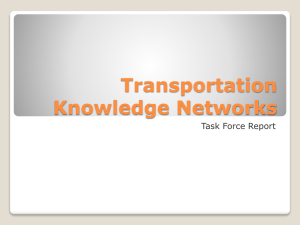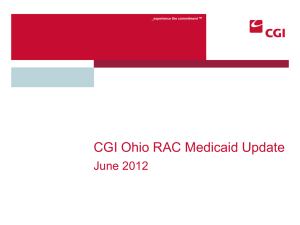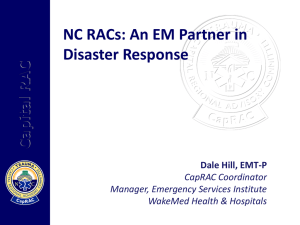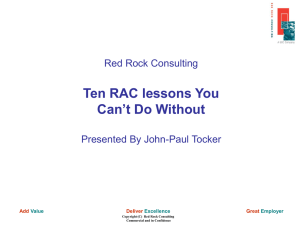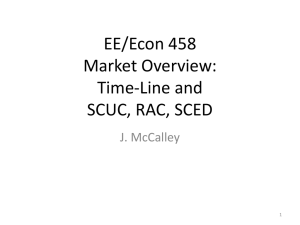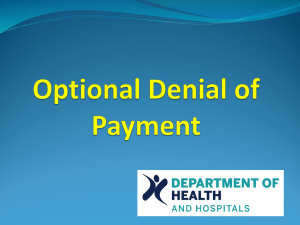PowerPoint - Health Care Conference Administrators
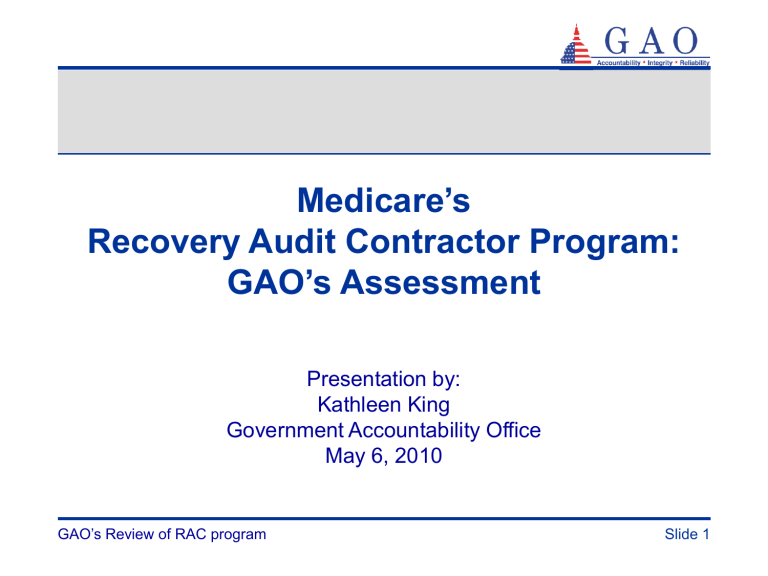
Medicare’s
Recovery Audit Contractor Program:
GAO’s Assessment
Presentation by:
Kathleen King
Government Accountability Office
May 6, 2010
GAO’s Review of RAC program Slide 1
Overview
• Introduction and Background
• Objectives
• Scope and Methodology
• Summary of Results
• Recommendations
• Contributors and Presenter Contact Information
GAO’s Review of RAC program Slide 2
Introduction and Background
• Congress requested that GAO study Medicare’s
Recovery Audit Contractor (RAC) program and make recommendations for its continued improvement.
• Our report was issued March 31, 2010:
Medicare Recovery Audit Contracting: Weaknesses
Remain in Addressing Vulnerabilities to Improper
Payments, Although Improvements Made to
Contractor Oversight (GAO-10-143).
GAO’s Review of RAC program Slide 3
Introduction and Background (cont.)
• The Medicare Prescription Drug, Improvement, and
Modernization Act of 2003 required the Centers for
Medicare & Medicaid Services (CMS) to implement a
3-year (2005-2008 ) RAC demonstration project to test whether RACs could effectively identify improper payments that could be recouped.
• The demonstration required RACs to review previously paid claims to identify payment errors.
• Improper payments identified by the RACs included duplicate payments for the same service or payments not in accordance with CMS policy.
GAO’s Review of RAC program Slide 4
Introduction and Background (cont.)
• As is typical of recovery auditing in general, CMS paid the
RACs a contingency fee on overpayments collected and underpayments refunded.
• The RAC demonstration contractors primarily focused on hospital claims in California, Florida, and New York.
• A CMS status report in November 2006 indicated RAC demonstration project success in identifying improper payments.
• The Tax Relief and Health Care Act of 2006 required CMS to implement a national RAC program. CMS began implementing the national program on March 1, 2009.
GAO’s Review of RAC program Slide 5
Introduction and Background (cont.)
• Providers reported problems during the RAC demonstration project and expressed concerns that these issues be resolved before national RAC implementation. Among issues identified:
• The contingency fee structure caused the RACs to “be aggressive” when determining payments were improper.
• RAC staff were not qualified to determine medical necessity, resulting in appeals, many still pending at the end of the demonstration project.
• CMS did not hold RACs accountable for the accuracy of their decisions.
GAO’s Review of RAC program Slide 6
Objectives
Our report examined the actions CMS took to:
1) Develop an adequate process and take corrective actions to address RAC-identified vulnerabilities that led to improper payments;
2) Build upon lessons learned from the demonstration project to resolve coordination issues in the national program between
RACs and Medicare Administrative Contractors (MACs) – additional CMS contractors with claims payment and processing responsibilities; and
3) Establish methods to oversee the accuracy of RACs’ claimsreview determinations and the quality of RAC service to providers during the national program.
GAO’s Review of RAC program Slide 7
Scope and Methodology
• Reviewed CMS’s Improper Payment Prevention Plan.
• Interviewed CMS officials, RAC staff, MAC staff, and representatives from provider associations.
• Reviewed key documents, such as the statements of work for RACs and MACs.
• Assessed RAC performance measures .
GAO’s Review of RAC program Slide 8
Summary of Results:
1) Addressing Vulnerabilities
• CMS did not establish an adequate process in the 3-year demonstration project or in planning for the national program to address RAC-identified vulnerabilities leading to improper payments.
• During the RAC demonstration CMS lacked a process to promptly:
• Evaluate RAC findings.
• Determine appropriate responses to RAC findings.
• Implement corrective actions.
GAO’s Review of RAC program Slide 9
Summary of Results:
1) Addressing Vulnerabilities, cont.
• As a result, most of the RAC-identified vulnerabilities that led to improper payment have gone unaddressed.
• CMS and its contractors did not address 60 percent of the significant vulnerabilities identified.
• Corrective actions were not taken on $231 million of $378 million in overpayments identified.
• As of March 2010, CMS lacked an adequate process for implementing corrective actions during the RAC national program.
GAO’s Review of RAC program Slide 10
Summary of Results:
2) RAC and MAC Coordination
• Prior to the beginning of the RAC national program,
CMS took action to resolve RAC and MAC coordination issues, such as
• continuing regular vulnerability calls.
• enhancing the data warehouse and developing an electronic documentation sharing system, and
• automating the claims-adjustment process and establishing a “black-out period” for MAC claims review.
GAO’s Review of RAC program Slide 11
Summary of Results:
3) Oversight of RAC Accuracy and Service
• For the national program, CMS took steps to improve oversight of RAC accuracy and service to providers:
• Established processes to review the accuracy of
RAC determinations and required additional RAC medical expertise to enhance program accuracy.
• Created Web site requirements for RACs designed to improve service to providers.
• Developed performance metrics to monitor RAC accuracy and provider service.
GAO’s Review of RAC program Slide 12
Recommendations
• GAO recommended that CMS develop and implement a process that includes policies and procedures to ensure that the agency promptly:
• evaluates findings of RAC audits,
• decides on the appropriate response and a time frame for taking action based on established criteria, and
• acts to correct vulnerabilities identified.
• GAO also recommended that CMS designate key personnel with appropriate authority to be responsible for ensuring that corrective actions are implemented and the actions taken are effective.
• CMS concurred with all our recommendations.
GAO’s Review of RAC program Slide 13
Key GAO Contacts and Contributors
•Key GAO Contacts
• Kathleen M. King, Director, Health Care,
(202) 512-7114, kingk@gao.gov, or
• Kay L. Daly, Director, Financial Management and Assurance,
(202) 512-9095, dalykl@gao.gov.
•Contributions to this work also were made by Sheila K. Avruch,
Assistant Director; Carla Lewis, Assistant Director; Lori Achman;
Jennie Apter; Anne Hopewell; Nina M. Rostro; and Jennifer
Saunders.
GAO reports are available to the public at: http://www.gao.gov/
Government Accountability Office,
441 G Street NW, Washington, D.C. 20548
GAO’s Review of RAC program Slide 14
